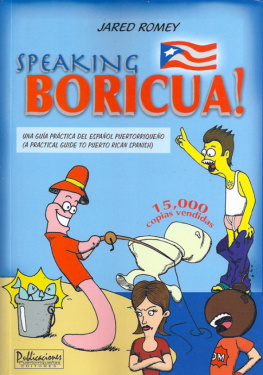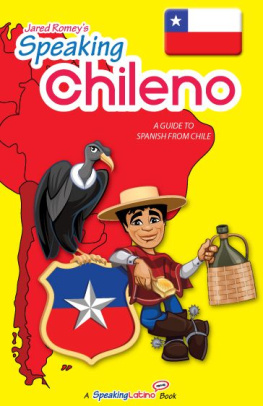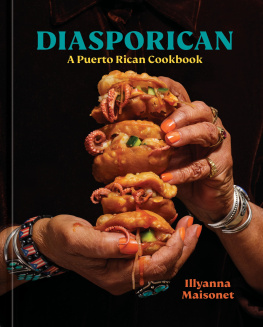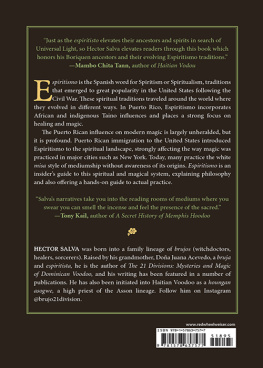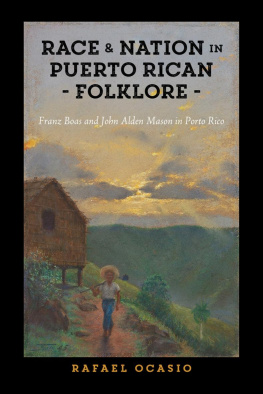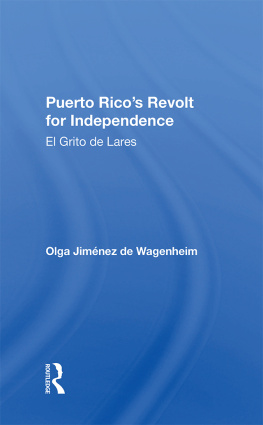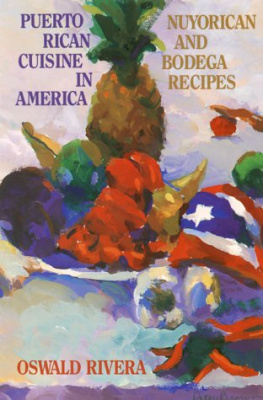SPEAKING BORICUA APractical Guide to Puerto Rican Spanish ByJared Romey Published by Jared Romey Smashwords Edition Copyright 2005 Jared Romey Discover other Speaking Latino titles by Jared Romey at Smashwords.com
Smashwords Edition, License Notes Thisebook is licensed for your personal enjoyment only. This ebook maynot be re-sold or given away to other people. If you would like toshare this book with another person, please purchase an additionalcopy for each recipient. If youre reading this book and did notpurchase it, or it was not purchased for your use only, then pleasereturn to Smashwords.com and purchase your own copy. Thank you forrespecting the hard work of this author.
ForMike and Polli... amigos, maestros y, sobre todo, padres pacientes TABLEOF CONTENT English Version
Versin en Espaol
Lexicon: Puerto Rican and Slang Words
INTRODUCTION When I first moved toPuerto Rico, I already spoke Spanish fluently, had traveled andlived in Latin America extensively, and was quite sure that my moveto Puerto Rico would be an easy transition. amigos, maestros y, sobre todo, padres pacientes TABLEOF CONTENT English Version
Versin en Espaol
Lexicon: Puerto Rican and Slang Words
INTRODUCTION When I first moved toPuerto Rico, I already spoke Spanish fluently, had traveled andlived in Latin America extensively, and was quite sure that my moveto Puerto Rico would be an easy transition.
What a fool I was! Ittook me over month to figure out what a mahnis, and much, much longer to understand m-k-w-n (I know, this ones tricky...try saying itout loud). Its now more than two years later, and Im stillpicking up new words every day.
The idea started one daywhen I thought it would be fun to keep a list of words (dontworry, you arent the only person that thinks I have a warped senseof fun) that were new to me. I began listening to lunchconversations, reading the newspaper, or just following theconversations of friends at late-night gatherings, to add to TheList. More often than not new words (to me) popped up inconversations. Just as often, my victims had no idea that theywere being studied. This allowed me to observe the language in itsraw, unedited daily usage.
I may occasionally refer tothe Puerto Rican language.
This is a non-technical phrase I usein reference to the uniqueness that has developed within theSpanish language in Puerto Rico. I chose the title SpeakingBoricua! because this uniqueness almost merits its own name.Thus, the naming of the modern language,Boricuan!
Some of these words andphrases are not specific only to Puerto Rico. I have compiled thislist largely based on my personal experiences with Spanish,specifically in Mexico, Chile, Argentina and PuertoRico.
At the same time, this isnot meant to be a definitive source on Puerto Rican language orslang. I just want to put together a guide to help visitors toPuerto Rico, Puerto Ricans who grew up outside of Puerto Rico, andeven native Puerto Ricans.
I have included shortsections on grammar and pronunciation for the occasional person(like myself) that actually enjoys these things. In my opinion, thenuances in any language can be better appreciated once the localgrammar and pronunciation are understood.
Languages are creaturesthat live and breathe, each with its own character and personality;they also provide a wonderful understanding of a culture and itspeople. But most importantly, theyentertain.
I hope this makes yousmile.
ACKNOWLEDGEMENTS The first steps that started this bookreally began in 1997 when I moved to Chile, even before knowinganything about Puerto Rico.
My dear Chilean friends took the time,mixed with lots of patience, to teach me the idiosyncracies ofChilean Spanish. With them I learned to enjoy the language. Thatheated up in me an interest to understand the language from eachcountry in which I have subsequently lived. For all their patienceduring my years there, I want to thank Andrea, Claudia B., ClaudiaN., Jessica, La Guera, Pamela, Rosa Estr, Teresita yVernica. I cannot think of Chile withoutthinking of Evelyn. Thank you...from the bottom of myheart.
Here in Puerto Rico, as I previouslymentioned, there are various people that never realized they werecontributing to this book. I loved listening to them and takingnotes. Their contributions are priceless. I learned a lot fromthem. Apart from the clandestineinvestigations, Arkel, Bertha, Diana, Laura and Ivelisse helped meunderstand the Boricua vocabulary. And for the foreign point ofview I cant leave out Gabriela and Ute.
I also need to mention my grandmother,Dorothy Main, who, with the games of Scrabble, introduced me to thepleasure that comes from learning a language well and using itcorrectly. Finally, the most important thanksbelongs to Brenda Latorre, the key person, from the beginning, inthe creation of this book. Without her help and (again) patience, Iwould never have finished it. At the same time, her family alsocontributed, with an island perspective of Boricuan. Thank you toeveryone!
HOW TOUSE THIS GUIDE First of all, this book should be usedas a basis for enjoying a visit to, living in, or even just,learning about Puerto Rico. In no way should this lexicon be seenas an academic, literary or reference work on thelanguage.
The words (I will use word in ageneral sense whose meaning also includes phrases so as not toalways repeat word/phrase) in this book will be written,whenever possible, similar to their pronunciation (ex.abombao and malcriao, although the correct spellingsare abombado and malcriado). Every once in a while,however, it is not possible to list a word as it is pronounced,because the pronunciation is so far off from the actual word (ex.me k w n, correctly written as me cago ennada). Throughout the lexicon the followingabbreviations have been used to facilitate the understanding anduses of words: Abbreviations & Meanings alt.sp. = Alternate Spelling
ex. = Example
exp. = Plural
pr. = Pronunciation
sl. = Slang
syn. = Synonym Besides the above abbreviations, thefollowing letters are located before a words entry and are to helpmake the lexicon a bit easier to enjoy (NOTE: The letter may applyto only one definition for words with more than one definition).The four letters are: C Commonly used words
F Foodrelated words
B Words thatmay not be acceptable in some circumstances, including expletives,insulting, crude or politically incorrect words.
E Englishroot words or words that have a relationship to English. = Synonym Besides the above abbreviations, thefollowing letters are located before a words entry and are to helpmake the lexicon a bit easier to enjoy (NOTE: The letter may applyto only one definition for words with more than one definition).The four letters are: C Commonly used words
F Foodrelated words
B Words thatmay not be acceptable in some circumstances, including expletives,insulting, crude or politically incorrect words.
E Englishroot words or words that have a relationship to English.
Example 1: CB anda pl car (anda para el carajo) : 1.damn, darn;used when you forget something or did something. 2.exp. tocommunicate surprise or disbelief. In Example 1 the two letters( CB ) clarifythe usage of the phrase. Following the letters in bold is the phrase that hasbeen written as pronounced. Then in parentheses is the correctwritten form of the phrase.
In the case of a word that has morethan one definition, each definition is marked by its correspondingnumber, and then followed by the definition. Example 2: le dieron hasta por dentro del pelo: literally they gave it to him even inside his hair, see ledieron como a pillo de pelcula. In the text of Example 2, theinformation within the quotation marks is a direct translation fromSpanish. This is included when the exact translation help clarifiesthe meaning of the text, or offers a touch of humor. Also in thisexample, in
Next page
